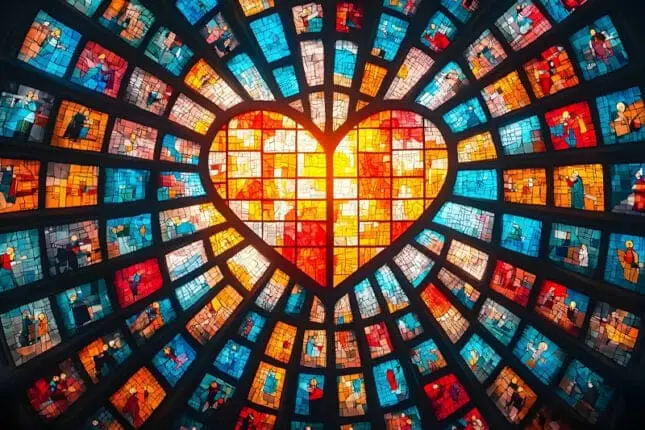God is love, or so they say. But in our increasingly secular society—one in which most people I know spend far more time on dating apps than in places of worship—the opposite has become true: love is God.
While this may seem like a relatively benign turn of phrase, there are weighty implications when the pursuit of romance replaces the pursuit of the divine as our primary holy quest. Let me clarify: When I say God, I’m not talking about religion. I’m also not talking about a concrete deity that lives in the sky. I’m talking about a belief in something larger than oneself, in a “beyond” that can’t be seen by the naked eye and requires a leap of faith. I’m talking about a pervasive and wild, benevolent mystery.
In the last century, “larger than oneself” has become siloed, often meaning just a tribe of two—you and a lover. While our existential anxieties were once quelled by religious beliefs, we’ve become reliant on romantic love as our primary way to self-soothe, make meaning, and manage our fear of mortality. Our hungry souls now gobble up the Disneyfication of love and the wedding industrial complex, which feed the fantasy that once we’ve found a partner and spent an extravagant amount of money on a party for family and friends, we’ll have finally found refuge, be at peace, and live happily ever after.
If we’re not conscious of this modern-day reversal, we run the risk of undermining our relationship to both love and God—relationships that need to be stronger and deeper now more than ever as our collective psyche is drawn further into a world of deepfakes, AI, and a merciless attention economy. We need to begin to re-conceptualize a romantic partner not as our destination, but rather as a fellow traveler on the road toward transcendence.
My job as a clinical psychologist is in part to create a safe container for clients to talk about whatever’s on their minds—from secret fantasies to unspeakable fears they ruminate on in the middle of the night. These days, however, God has climbed the charts to become one of the most taboo topics in the treatment room. While clients may casually detail their lurid sexual encounters, they become shy and almost whisper when they bring up the G-word. I too find myself avoiding the topic, aware that depending on a client’s upbringing and belief system, the mention of God has the potential to be confusing, alienating, or triggering.
Prospective partners, on the other hand, are sometimes ascribed magical, God-like qualities, which can make someone feel high in the beginning of a relationship but result in excruciating disappointment when they fail to live up to their deification. This cycle of limerence frequently repeats itself with new lovers. What was once a search for divine oneness has morphed into “looking for the one,” an external entity, something we can touch and attain—potentially just a swipe away. In some ways, romantic love has replaced religion as the opiate of the masses. Instead of the poppy growers of Asia getting rich, it’s the dating startups of Silicon Valley. We buy what they sell because we’re eager to fill the god-sized hole in our hearts. The supply can never exceed the demand.
The high we get from love isn’t the problem, though—it’s the withdrawal that devastates us.
The moment romantic love is removed from its unrealistic place in the heavens, brought down the earth, and the flimsy rom-com fantasy bubble bursts—this is the moment when we and our clients can make love a place of spiritual practice, if we choose to. Can we bear it when that golden sheen rubs off our lover and a fundamentally flawed human being emerges? Can we stay put when our partner sees our flaws? Or does it suddenly feel as if God is dead?
When a partner is no longer under pressure to live up to a God-like fantasy, they can be seen, accepted, and loved for who they are. It’s in this process that the act of loving becomes holy. Carl Rogers, the father of humanist psychotherapy, said, “People are just as wonderful as sunsets if you let them be. When I look at a sunset, I don’t find myself saying, ‘Soften the orange a bit on the right-hand corner.’ I don’t try to control a sunset. I watch in awe as it unfolds.” It’s spiritual work to widen our window of tolerance for discomfort in relationships, just as it’s spiritual work to widen our window of tolerance for discomfort in our lives. Love as a spiritual practice means we watch in awe as our partner unfolds.
As therapists, we can help our clients unearth a third thing—the thing that’s larger than both of them, grounded in meaning and purpose, which helps them foster connection to a benevolent mystery. While this could be the exploration of relationship to God or source, it could also be broader, including becoming part of a community, being of service, or supporting a cause. Whatever it is, a third thing can widen our own and our client’s aperture around what’s holy, expanding our definition of love to include, rather than center on, a partner. Then, instead of perpetually facing a loved one in search of the divine in the human, we can turn outwards and learn to walk side-by-side into the deep.
Jordana Jacobs
Jordana Jacobs, PhD, is a New York City-based clinical psychologist in private practice, a speaker, and a meditation guide. Her work at Memorial Sloan Kettering, as well as her Vipassana meditation practice and studies in Northern India, inspired her research on the relationship between death awareness and love. You can learn more about her at: drjordanajacobs.com.











